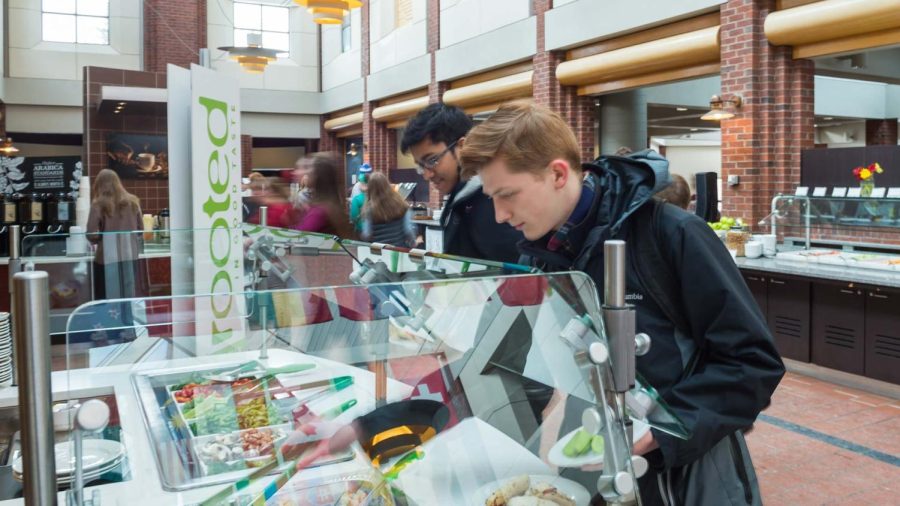University Struggles With Pandemic-Related Staffing Shortages
As students returned to a campus with far fewer restrictions in August with Colgate’s vaccine mandate in effect, departments across campus have struggled to keep up with the return to heightened operations due to widespread staffing shortages — an issue plaguing this transition at colleges and universities across the country.
Don Stanwick, the resident district manager of Dining Services, said that shortages have plagued dining services since the start of the academic year — operating at 50% of their usual staffing levels since August 2021.
“We were short almost 65 people to what our normal staff was,” Stanwick said. “We’ve worked hard to get staff hired, and we’ve hired a few [employees], but we’re still probably close to running 30 [people] short.”
Student employment hired a record number of Colgate students to fill these positions across dining locations on campus this year, including Chobani Cafe, Donovan’s Pub, and the coffee stand in Frank Dining Hall.
“The goal is to continue to try to build student employment opportunities, and even give students opportunities for after graduation,” Stanwick said.
While Colgate’s staffing shortages have impacted campus operations, they are far from unique — staffing shortages are plaguing higher education institutions, particularly in dining and food operations, but across the board as well. The trend was pushed by a return to scaled-up on-campus operations this academic year after pandemic-related reduced capacities the year prior, a trend the Chronicle of Higher Education described as higher education’s “rocky reboot,” exacerbated by supply chain issues.
“We are in an all-out battle to keep our staffing levels up,” President Brian Casey told the Maroon-News in February, noting that staffing levels made Colgate’s check-in and testing protocols upon return to campus for the spring semester challenging. “The [check-in] staffing was hard, and staffing in general at the university is hard.”
Casey added that the shortages have spilled over into Colgate-owned businesses in the town of Hamilton — the Tavern at the Colgate Inn is not currently serving food on Tuesdays and Wednesdays as a result.
“They don’t have the people — [the issue] is everywhere,” Casey said. “I was on the phone with another college president and one-third of their positions are empty — one-third — and this is a big metropolitan university.”
Locally-owned Hamilton businesses have also faced staffing shortages since the pandemic’s onset — Rye Berry owners Krista and Patrick Gramens said in their announcement that ongoing staffing issues went into their decision to close the business after serving as a community staple for the last four years. Flour & Salt owners Britty and Brendan O’Connor, who plan to take over Rye Berry’s space on Lebanon Street around the corner from their Maple Avenue location, have also been candid on Flour & Salt’s social media about the impact of staffing shortages on business operations.
Although increases in student employment have aided in filling positions, the staffing issues are far from over, as Dining Services and other departments, including Building and Grounds, continue to face issues.
“It’s been really tough with all the shortages in staffing but I’m really proud of our B&G team for all the hard work with such short staff,” Associate Vice President for Facilities and Capital Projects Stephen Hughes said.
Director of Campus Safety Terri Stewart said the shortage has left the department short an officer and an administrative team member, positions Campus Safety is currently beginning the search to fill.
As the issue is impacting staff departments across campus, students are also feeling the impacts of shortages. First-year Caroline Harlow said she’s noticed dining services staff stretched thin, having to perform multiple jobs at once.
“The other day in Frank [Dining Hall], I had to wait 10 minutes for the person to swipe my card because they were working the coffee station, too,” Harlow said.
While shortages represent a nationwide trend in higher education, Stanwick said finding employees is particularly difficult for dining services given Colgate’s rural location.
“The area really plays a big part in it, and why we probably struggle more than some of the other [insitutions] that might be in a more populated area,” Stanwick said.
As dining services saw an uptick in employment applications beginning in January, and as many pandemic-related restrictions are lifted on campus and statewide, there are signs things may be changing.
“That fills me with hope — as we move forward — that there’s going to be more people in the job market looking for different positions,” Stanwick said.
But as the pandemic continues to disrupt industries nationwide, the university continues to deal with shortages across student employment, temporary staffing agencies and reduced hours, according to Stanwick.
Karenna Warden and Kirby Goodman contributed to reporting.

Annabel Morris is a senior from Rumson, NJ concentrating in political science and minoring in Middle East & Islamic studies and anthropology. She has...




